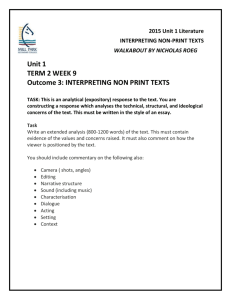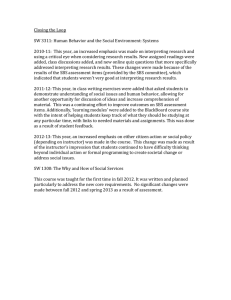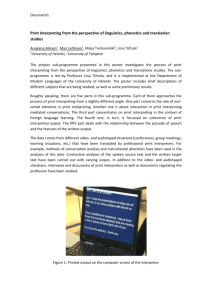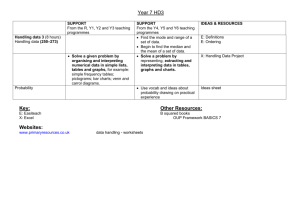Interpreting Assessment Strategy
advertisement
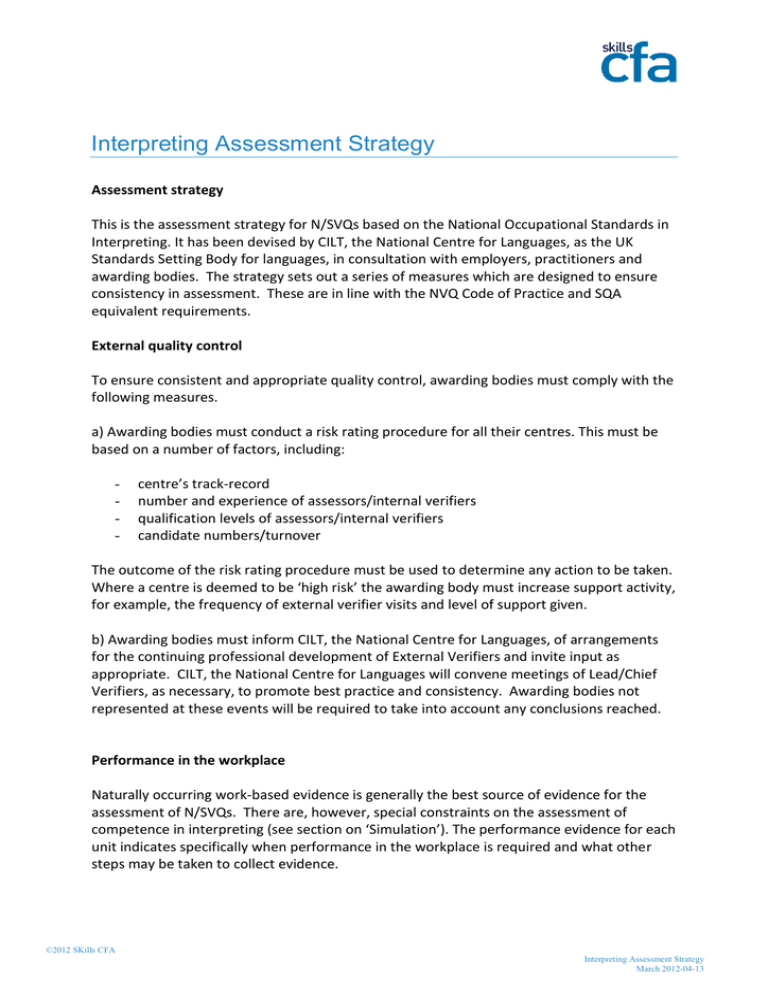
Interpreting Assessment Strategy Assessment strategy This is the assessment strategy for N/SVQs based on the National Occupational Standards in Interpreting. It has been devised by CILT, the National Centre for Languages, as the UK Standards Setting Body for languages, in consultation with employers, practitioners and awarding bodies. The strategy sets out a series of measures which are designed to ensure consistency in assessment. These are in line with the NVQ Code of Practice and SQA equivalent requirements. External quality control To ensure consistent and appropriate quality control, awarding bodies must comply with the following measures. a) Awarding bodies must conduct a risk rating procedure for all their centres. This must be based on a number of factors, including: - centre’s track-record number and experience of assessors/internal verifiers qualification levels of assessors/internal verifiers candidate numbers/turnover The outcome of the risk rating procedure must be used to determine any action to be taken. Where a centre is deemed to be ‘high risk’ the awarding body must increase support activity, for example, the frequency of external verifier visits and level of support given. b) Awarding bodies must inform CILT, the National Centre for Languages, of arrangements for the continuing professional development of External Verifiers and invite input as appropriate. CILT, the National Centre for Languages will convene meetings of Lead/Chief Verifiers, as necessary, to promote best practice and consistency. Awarding bodies not represented at these events will be required to take into account any conclusions reached. Performance in the workplace Naturally occurring work-based evidence is generally the best source of evidence for the assessment of N/SVQs. There are, however, special constraints on the assessment of competence in interpreting (see section on ‘Simulation’). The performance evidence for each unit indicates specifically when performance in the workplace is required and what other steps may be taken to collect evidence. ©2012 SKills CFA Interpreting Assessment Strategy March 2012-04-13 Simulation There is ample evidence from the field that there are occasions when it is impossible or inadvisable to assess candidates’ competence through normal working practice. This applies in particular when: collecting real workplace evidence would intrude on confidentiality or privacy, for example: o interpreting to support a legal case on child protection; o providing a written or sight translation of a letter dealing with immigration status; o interpreting during a medical appointment for mental health reasons, or a police interview with a defendant. arranging observation is difficult and/or expensive, for example while working on the client’s premises, far away from the assessment base the candidate may experience an unreasonable delay in collecting evidence to prove his/her competence. In cases where collection of evidence in the workplace is not possible for the reasons given above, CILT will allow simulation of assignments, provided that they mirror the potential or actual workplace environment. In the case of interpreting this means that at least two people who do not speak or sign the same language are engaged in meaningful communication through the means of interpreting. Occupational expertise of assessors and verifiers Assessors, internal verifiers and external verifiers must hold appropriate assessor/verifier qualifications, as currently required by the regulatory authorities. For England, Wales and Northern Ireland, where assessors and internal verifiers do not hold the appropriate qualifications, they must achieve the award within 18 months of appointment, also until they are qualified, decisions must be countersigned by a qualified assessor or verifier. In Scotland these requirements are covered by the regulatory body and awarding bodies will be required to abide by current legislation. Additionally, awarding bodies must ensure that assessors/verifiers meet the following occupational expertise requirements. Assessors must have: language and interpreting skills accredited to a minimum of NVQ level 4 (or the equivalent NQF or SCQF level); ©2012 SKills CFA Interpreting Assessment Strategy March 2012-04-13 up-to-date knowledge of the field of interpreting demonstrated by a record of continuous professional development that is reviewed at least every two years and is planned to include developments in the domains in which they assess; current and relevant experience of working as interpreters; knowledge and understanding of competence-based qualifications; in-depth knowledge of the Interpreting Standards; ability to make objective and reliable judgements about candidate competence. Internal verifiers must have: sufficient expertise in language and interpreting to enable them to verify assessment decisions and give advice to assessors; up-to-date knowledge of the field of interpreting demonstrated by a record of continuous professional development that is reviewed at least every two years and is planned to include developments in the domains in which they assess; knowledge and understanding of competence-based qualifications; in-depth knowledge of the Interpreting Standards. External verifiers must have: sufficient expertise in language and interpreting to enable them to verify assessment decisions and give advice to assessors, internal verifiers and centres on the quality and consistency of delivery; up-to-date knowledge of the field of interpreting demonstrated by a record of continuous professional development that is reviewed on at least an annual basis and is planned to include developments in the domains in which they assess; knowledge and understanding of competence-based qualifications; in-depth knowledge of the Interpreting Standards and the awarding body quality assurance procedures. ©2012 SKills CFA Interpreting Assessment Strategy March 2012-04-13
